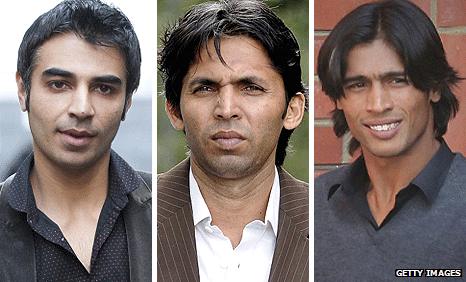Pakistan cricketers Butt, Asif & Amir profiled
- Published

Butt, Asif and Amir were three of Pakistan's best performers in recent years
Pakistan cricketers Salman Butt and Mohammad Asif have been jailed after being found guilty of their part in a "spot-fixing" scam after a trial at Southwark Crown Court.
Former captain Butt, 27, and fast bowler Asif, 28, were both found guilty of conspiracy to cheat and conspiracy to accept corrupt payments.
Another fast bowler Amir, 19, admitted the charges prior to the trial.
Here, BBC Sport profiles the three players at the centre of the scandal.
SALMAN BUTT
A top-order batsman, Butt made his Test debut aged only 18 in 2003 and scored his maiden century against an Australian attack, including Glenn McGrath and Shane Warne, in his fourth match.
Talented but inconsistent, the Lahore-born left-hander was unable to show the steadiness to hold down a regular place in the Pakistan side, although he did make a century against England when they toured the sub-continent following their 2005 Ashes win.
His longest exile from Test cricket came after Pakistan lost 1-0 in India in 2007, but on his return to the side, in 2009, Butt was finally able to make one of the openers' spots his own.
A third Test century followed on the troubled tour of Australia and, after a number of senior players were suspended, Butt was promoted to vice-captain.
He took on the mantle of skipper when Shahid Afridi decided to retire from Test cricket midway through the 2010 series in England and led Pakistan to victory in the third Test at The Oval.
Butt won praise for the way he led a side that, in the previous 18 months, had endured the terrorist attacks on the Sri Lanka team in Lahore that led to the cancellation of international cricket in Pakistan, the woeful tour down under and some inept performances in England.
Going in to the final Test at Lord's, Pakistan were hopeful of gaining a victory that would have squared the series, but were trounced in a match overshadowed by betting scam allegations.
Butt denied all the claims against him but was found guilty and sentenced to 30 months in prison after being described as the "orchestrator of this activity" by the judge, Mr Justice Cooke.
MOHAMMAD ASIF
At his best, Asif could justifiably claim to be among the best seam bowlers in the world.
He made his Test debut on the tour of Australia in 2005 - just four months after a stint in North Staffordshire club cricket. However, he had to wait more than a year for his second cap.
With a whippy, elasticated action, Asif relied on accuracy rather than pace. An 11-wicket haul in his fifth match against Sri Lanka confirmed his value to the Pakistan team.
In tandem with Mohammad Amir, Asif formed one of the most dangerous new-ball partnerships in the world - albeit it in a side that was prone to self-destruction.
The English conditions on the tour of 2010 suited Asif, with his ability to move the ball both ways off the seam and, at the time of the final Test, he was rated as the third best bowler in the world.
But Asif became mired in controversy amid allegations of a betting scam.
He denied all charges against him but was jailed for 12 months after being found guilty.
MOHAMMAD AMIR
The teenage bowling sensation was named player of the series for his performances against England last summer.
Amir, 19, became the youngest player ever to take 50 Test wickets and thrilled English crowds with his pace, control and mastery of swing.
However, he was persuaded to deliver two deliberate no-balls during the Lord's Test, the second of which came during a spell where he took three England wickets in nine balls.
Amir made his Test debut for Pakistan in 2009 but quickly became a fixture in the side and seemed destined to become one of the all-time great fast bowlers.
Amir admitted the charges prior to the trial and his lawyer said his client "accepts full responsibility for deliberately bowling two no-balls".
He added: "In due course, you will hear how this vulnerable 18-year-old boy was subjected to extreme pressure from those on whom he should have been able to rely."
He was sent to a young offenders institute for six months.